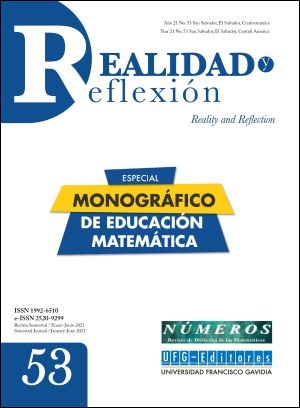Children who counted: in social risk situations and of mathematics learning exclusion
DOI:
https://doi.org/10.5377/ryr.v53i53.10888Keywords:
children calculate, subjective configurations, mathematical learning, learning and inclusionAbstract
The search for understanding the constitution of the mathematical being as a subject who learns and produces subjective meanings of their ability to develop mathematical knowledge finds, in the category “subject who learns”, of the Theory of Subjectivity-TS, a concept that both broadens and deepens the interpretive analyses of the mathematical constitution of children. The TS allows to expand the understanding of the phenomenon of mathematical learning beyond the strictly cognitive analysis, of microgenetic analysis of the mathematical records production, which we have carried out in the last decades supported by the Theory of Conceptual Fields. Supported by conversations that we obtained in playful mathematical workshops and with mothers about their educational histories, we sought subjective meanings in the history of the mathematical learning of four children at risk. In addition to the dialogue established during the playful workshops, we collected their mathematical productions. These records, added to the constant dialogues in context, allowed the analysis and explanation of mathematical schemes implicit in these mathematical productions and revealed important elements of complex mathematical learning processes. However, the microgenetic analyses were not enough to unveil the complex symbolic-emotional dimension of mathematical learning meaning by the subjects. The dialogue with the children and their mothers, which was video-recorded, supported a better understanding of the nature of the productions and their meanings beyond the situation of playful activity. This article is limited to present the analysis of only one of these investigated cases - a boy with hearing loss, who struggled with the organization of mathematical algorithms.
Downloads
335
Downloads
Published
How to Cite
Issue
Section
License
© Universidad Francisco Gavidia
Instituto de Ciencia, Tecnología e Innovación (ICTI)
Reality and Reflection
The content and opinions expressed in the publication are the responsibility of the authors of the published articles. The authors assign the publishing and publishing rights, in printed and digital version, to the Universidad Francisco Gavidia.
Proof of originality and assignment of publication rights
The authors must sign a certificate in which they indicate that the text presented for publication is original, unpublished and that it has not been sent for review in another academic publication; In turn, the authors assign the rights of publication and publication to Francisco Gavidia University. The format of this record will be sent through the emails: editores@ufg.edu.sv and jlozano@ufg.edu.sv
The journal Reality and Reflection is housed in the institutional dissemination platforms (web page and in the repository), as well as in databases and other pages of scientific dissemination. The publications of the Francisco Gavidia University are subject to the Salvadoran copyright law, contemplated in the Intellectual Property Law https://www.asamblea.gob.sv/
The content of the work is the sole responsibility of the author, therefore, if for any reason or reason, direct or indirect, the Editor is obliged to pay any compensation to a third party derived from the work of the author, whether it is established in a transaction, agreement or final or enforceable judicial sentence, the Editor may repeat against the Author for the total amount of compensation, plus adjustments, interests and costs that correspond.
It will be the obligation of the UFG to grant five copies of the publication which will be delivered at the UFG Editores headquarters in San Salvador.

